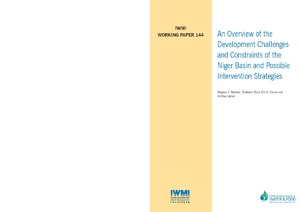Location
The International Water Management Institute (IWMI) is a non-profit, scientific research organization focusing on the sustainable use of water and land resources in developing countries. It is headquartered in Colombo, Sri Lanka, with regional offices across Asia and Africa. IWMI works in partnership with governments, civil society and the private sector to develop scalable agricultural water management solutions that have a real impact on poverty reduction, food security and ecosystem health. IWMI is a member of CGIAR, a global research partnership for a food-secure future.
IWMI’s Mission is to provide evidence-based solutions to sustainably manage water and land resources for food security, people’s livelihoods and the environment.
IWMI’s Vision, as reflected in the Strategy 2014-2018, is ‘a water-secure world’. IWMI targets water and land management challenges faced by poor communities in the developing countries, and through this contributes towards the achievement of the United Nations Millennium Development Goals (MDGs) of reducing poverty and hunger, and maintaining a sustainable environment. These are also the goals of CGIAR.
IWMI works through collaborative research with many partners in the North and South, and targets policymakers, development agencies, individual farmers and private sector organizations.
Resources
Displaying 391 - 395 of 959Healthy wetlands, healthy people: a review of wetlands and human health interactions.
Despite the production of more food and extraction of more water globally, wetlands continue to decline and public health and living standards for many do not improve. Why is this – and what needs to change to improve the situation? If we manage wetlands better, can we improve the health and well-being of people? Indeed, why is this important? This report seeks to address these questions.
Originally Published In: Ramsar Technical Report No. 6. Geneva, Switzerland: WHO; Gland, Switzerland: Ramsar Convention Secretariat
The Nile River Basin: water, agriculture, governance and livelihoods
This book covers the whole Nile Basin and is based on the results of three major research projects supported by the Challenge Program on Water and Food (CPWF). It provides unique and up-to-date insights on agriculture, water resources, governance, poverty, productivity, upstream–downstream linkages, innovations, future plans and their implications. Specifically, the book elaborates the history, and the major current and future challenges and opportunities, of the Nile River Basin.
An overview of the development challenges and constraints of the Niger Basin and possible intervention strategies
The Niger River Basin covers 7.5% of the African continent, and is shared between nine riparian
countries. The basin countries can be categorized into water resources producers, consumers, both
producers and consumers, and minimum contributors and consumers. As in the case for most
transboundary rivers, upstream and downstream conflicts emanating from the development and
utilization of the Niger River are inevitable and are expected to be intense, particularly given the







